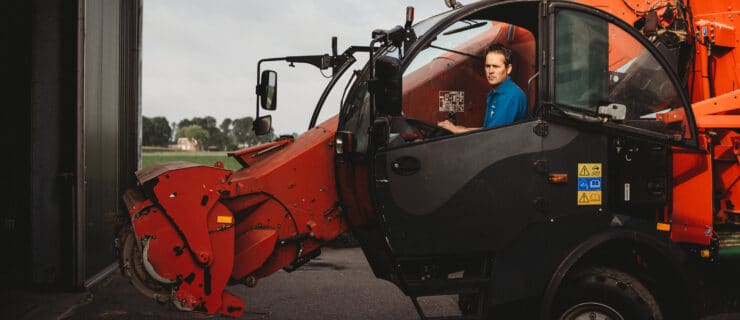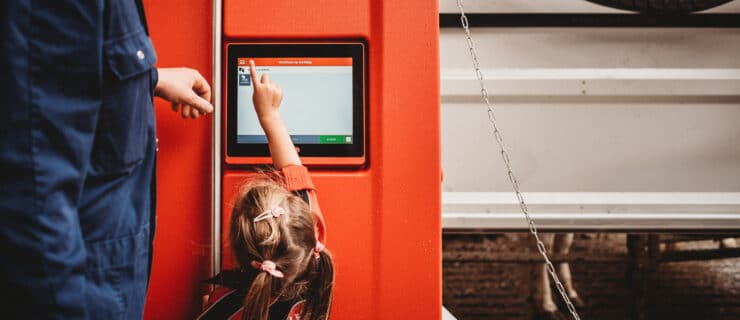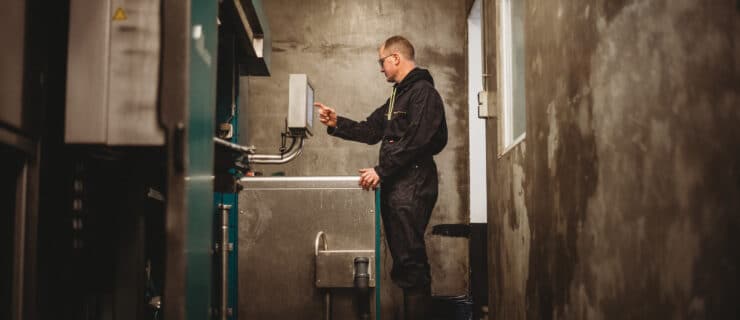What do JoinData users think about sharing data? What developments are they looking out for? What are their views on ownership of data? What kind of apps and innovations may come in useful for farmers? Director Sener Celik talks to several farmers and organizations in the Netherlands, to get an idea of the common opinions.
Together with his wife Amber, Mathé van den Bosch milks 330 milk cows with 5 robots in Oudenbosch (N.-Br.). The company has 95 hectares of land and employs 1 FTE.
Tjebbe Huybrechts is Global business development manager at CRV. He deals with livestock products, JoinData in the Netherlands, and DjustConnect in Flanders.
The company of the innovative dairy farmer Mathé van den Bosch is located in Oudenbosch, in the west of Noord-Brabant. Mathé’s company is a testing location for Lely, which means that we cannot take a look in the stables. In the garden, at a proper distance, the dairy farmer sits down to talk to Sener and Tjebbe about sharing data, innovations and privacy. A conversation between three impatient people, who want to keep moving. Sener gets down to business right away.
Sener: I support sharing as much data as possible, because I think this leads to new combinations. Which will then lead to new insights and innovation. This is an advantage for all parties. But, we are sometimes walking on egg shells, and we’re still careful about sharing data. How do you feel about this? Are you worried about your privacy, for instance?
Mathé: I no longer have any illusions about privacy. I think we have very little privacy left. But if we don’t have privacy anyway, let’s make the most of it.
Tjebbe: It’s easy to see problems everywhere. Many dairy farmers see sharing data as a threat. But I hope that everyone will start to feel more positive about it, and that dairy farmers will start seeing opportunities in sharing data.
“My company runs on data”
Mathé: My company runs on data. When I get up in the morning, I check my phone first, to see what the cows have eaten, the alert list, the cost price. My automatic feeding system saves on labor, but the most important advantage is the amount of data it produces. Is it weird that I look at my cost price every day? Actually, it’s weird that many dairy farmers don’t look at their cost price every day. People spend so much time checking their production, number of cows and number of hectares in our sector. I am an entrepreneur to earn a living. Checking the cost price has so many advantages.

Tjebbe: Every year, I have a guest lecture at the university, and I ask my students what the definition of a good farmer is. I get answers like ‘someone who takes good care of the cows’, ‘someone who achieves a good production’ etcetera. But in the end, having a good yield with healthy cows is the most important thing. You can only start investing in sustainability if you have a good yield. You have to work on your income first, before you can set other goals.
Mathé: That’s right. And you can learn this by looking at your data. It’s also fun to play around with this and see what adjustments you have to make.
Sener: Mathé, what should be improved about the data flows?
Mathé: At the moment, I find myself switching a lot between programs like those of Lely and CRV. I am actually looking for a coupling, so that I can have an overview of all my data on one dashboard. And, for example, I find it strange that my inseminator can’t see what my second SAP advice is for a cow. It needs to check my PC for that, and that seems more privacy-sensitive to me than letting it know my second SAP choice.
Wouldn’t it be great if T4C (management program from Lely) , VeeManager, RVO and the app from the calf drinking station were linked?
Sener: What if someone could get all that in one application?
Mathé: I would appreciate that. It could also be divided in separate web environments, all with their own links. I think we’re only just getting started with data.
Tjebbe: How so?
“I think we need to go from a lot of dead data, the bare figures, to data that works by itself”
Mathé: Well, let me ask you. For example, let’s look at cows in heat. I check VeeManager and segregate them via T4C, so that they are ready for the inseminator. But why can’t I tap on the cows in heat in the computer, so that they are segregated automatically? And that a request is made to CRV with my bull picks? I think we need to go from a lot of dead data, the bare figures, to data that works by itself.

Tjebbe: We could develop something like this, but the demand is still marginal. The group of farmers that is running ahead of the herd.
Mathé: But then how can we stay ahead as a sector? In the Netherlands, we’re all about knowledge and innovation. If we have the mentality to only make products for the mass, we as a sector won’t be frontrunners anymore in 20 years.
Sener: What if sharing data becomes part of the law?
Tjebbe: Then there will be discussions about the revenue model. Who exactly is making money from the data itself and the applications that are built with the data? And you will have discussions about visibility. Imagine that you have a large dashboard with a small CRV logo somewhere at the bottom, are they visible enough? Or say we have to make the sperm more expensive, because we are giving away data for free, would our members want that?
Sener: CRV is an international player, how do other countries deal with sharing data? Who are the competitors?
Tjebbe: In America there’s ABS, Select Sires and Urus. But In America, they’re jealous of how liberal we are about sharing data. Farmers in the Netherlands know what data they share with whom, and what it is used for. If Urus, for example, wants extra data, they will buy the company, as they did with VAS recently. They do innovate, but they don’t build it themselves. JoinData is a pioneer in this, which is something to be proud of.
Sener: At the moment, I don’t think developments in data exchange are moving fast enough. Competitors outside of Europe (such as Alibaba) will soon overtake us if we don’t speed things up. CRV is among the fastest when it comes to sharing and using data. While this is not always advantageous for their revenue model. I respect them a lot for that. There were machinery suppliers who wouldn’t even talk to me three years ago, who are now calling me themselves to do business. That is a nice development, and hopefully the pace will be increased over the coming period.
Tjebbe: I believe there are three very impatient people at this table.

Sener: Of course there are parties who wait until there is no other option. They don’t see the added value in the short term, have an existing business model based on the distribution of data, and they haven’t picked a clear new strategy in this playing field yet.
Tjebbe: You can also view sharing data as making a big cake together and sharing that one, instead of sharing the cake you already have. What we know for sure, is that things can’t stay the same for the next 10 years. We have to keep innovating.
Sener: In financial services, the fintech sector, there are already various new innovations based on data. This sector is rising quickly, supported by the new laws regarding data. In the agricultural sector, we will have to speed things up.
“I would like to automate everything”
Mathé: I would like to automate everything. Automatically ordering feed when it runs out, automatically ordering fertilizer if a soil examination shows that there is a lack, or automatically calling the vet in, if a blood test shows that there’s something wrong with a cow. The skill of the farmer will be in the consideration that a calculation model does it better than you. A PC usually knows there is a problem before I do. I can’t constantly watch 330 cows, so I have to trust in automation. Craftsmanship is delegation. I have actually always been an automation farmer. Together with my parents, we started automatic milking in 2000, and the first feeding robot was developed by Lely on our terrain.
Sener: Are you often approached by new data service providers?
Mathé: Never, but if I would have to pay €200 a month for an app with all those separate applications running in the background, I would do it. I am not afraid of leaks in data exchange. And what if it leaks? What use is data about the feed value of my pit to others? I would like to continue to develop myself. If I sit still for too long, I become impatient.
Sener: Do you think that data-driven farmers should get a better milk price?
Mathé: Well, I would rather see them get more space when it comes to fertilization. For example, more freedom if you have a better score in the Cycle Guide. But then this needs to be properly safeguarded. The government can know everything I do, as long as I get freedom in return.
Tjebbe: What are your concerns about dairy farming?
“In the Netherlands, we’re all about intelligence and smart decisions”
Mathé: In the Netherlands, it’s not about having more cows, but about intelligence and smart decisions, so we need data exchange, but there’s still so much to do. The government pays a lot of attention to the short term, instead of having a vision for the long term.
Sener: In our conversations with our clients, we notice that they are hesitant to sign up at first, until they realize that JoinData has no interest in the data, and doesn’t store it.
Mathé: I actually think it’s practical if all data is in a certain cloud.
Tjebbe: Who should be your guard dog for the use and possible storage of data?
Mathé: JoinData is a corporation, so the board of commissioners will be the guard dog.

Sener: And do you also have an assignment for me?
Mathé: Maybe a seminar with all the partners about the opportunities of data exchange? So that there can be more exchanges, with more parties.
Tjebbe: Sener, I think it would be a good idea to make use of Mathé’s level-headedness. Companies have to make themselves vulnerable. That way, there can be a real dialogue. In the short term, more data exchange will create some tensions here and there, but we can figure it out by talking about it. Then you can take opportunities together, instead of seeing threats.



